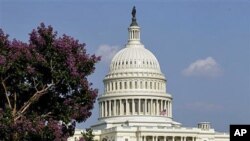With a deadline looming to cut America’s massive federal deficit, lawmakers of both parties appear to be softening rigid ideological stances in hopes of striking a bipartisan accord that would put the United States on a sounder fiscal path.
Economists overwhelmingly agree the U.S. government needs to spend less and collect more tax revenue if trillion-dollar deficits are to be erased. But most Republicans oppose tax hikes of any kind, and most Democrats oppose deep spending cuts to programs that benefit the poor and the elderly. The result has been gridlock in a politically-divided Congress where neither party can impose its will, and compromise is the only path to enact legislation.
Now, a glimmer of hope. With weeks remaining for a bipartisan congressional committee to shave $1.2 trillion in deficits during the next decade, a small but growing number of lawmakers from both parties are setting aside ideological demands in hopes of forging a consensus for deficit reduction totaling $4 trillion or more.
Congressman Mike Simpson of Idaho is one of dozens of Republicans who now acknowledge the need for greater tax revenue.
"The reality is, you cannot get to $4 trillion without including additional revenues. More revenue is key to this," he said.
Simpson spoke on the Fox News Sunday television program. He helped craft a letter, now signed by more than 100 lawmakers of both parties, urging a combination of spending cuts and higher revenues for deficit reduction.
The other sponsor of the letter is Democratic Congressman Heath Shuler of North Carolina, who says his party must be willing to accept significant spending cuts in the interest of national solvency.
"In order to save these [federal] programs, we have to make sure that they have long, more sustainable resources, but also get rid of the fraud and abuse that has been in the programs for quite some time," said Shuler, who also spoke on Fox News Sunday.
Specifically, Shuler said that so-called entitlement programs that provide income and health care for retirees must be reformed to make them less costly, and cannot be excluded from deficit reduction efforts.
The deficit super-committee has until November 23 to find ways to trim the deficit by a minimum of $1.2 trillion. With the clock ticking, reports from Capitol Hill say the committee has been deadlocked on partisan lines. Should it fail to meet the deadline, automatic spending cuts would be triggered beginning next year.
Representative Simpson says, not only must the committee bridge partisan divides, it must exceed the $1.2 trillion target.
"That [$1.2 trillion] does not stabilize the debt, and does not start paying down our deficit. It is kicking the can down the road [putting off hard choices], and, frankly, we are out of road. We have to make some very difficult decisions," he said.
Despite efforts to find common ground between Democrats and Republicans, partisan differences remain. For example, most Democrats want to raise tax rates on the wealthy, while Republicans only appear willing to eliminate tax deductions.
This year’s federal deficit totals $1.3 trillion. Cumulative federal deficits constitute the national debt, which stands at nearly $15 trillion, nearly equivalent to the U.S. gross domestic product.
Signs of Compromise to Reduce US Deficit




